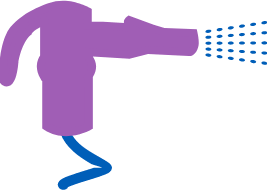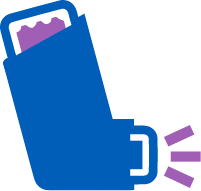Find answers to the most common questions about COPD and COPD treatments, including once-daily YUPELRI.


YUPELRI FAQs
YUPELRI is a once-daily treatment that lasts 24 hours and helps you breathe easier
-
What is COPD?
COPD stands for chronic obstructive pulmonary disease. It refers to a group of diseases that cause airflow restriction and breathing-related problems, such as chronic bronchitis and emphysema. COPD is a progressive disease, which means it gets worse over time. Millions of people have COPD, but it does not affect everyone in the same way.
-
What are the symptoms of COPD?
The most common symptoms of COPD are coughing, wheezing, and shortness of breath. Other symptoms, such as chest tightness, excess mucus, disrupted sleep, and fatigue, can also occur.
-
Can COPD be cured?
There is currently no cure for COPD, but there are many treatments that can help manage symptoms. Taking your medicine as prescribed is a major part of successfully managing the disease.
-
How is COPD treated?
There are two main types of COPD treatments:
- Short-acting treatments, or rescue medicines, relieve sudden symptoms but are not usually meant to be taken every day
- Long-acting treatments, or maintenance medicines, help control COPD symptoms and are meant to be taken every day
Many people with COPD use both types of treatment to manage symptoms.
-
How are COPD medicines taken?
COPD medicines are primarily delivered through either a nebulizer or an inhaler.
Nebulizer

- A machine that turns liquid medicine into a fine mist that can be easily inhaled
- Delivers medicine to your lungs while you breathe normally (calmly, deeply, and evenly) through a mouthpiece until the mist is gone*
Inhaler

- A device holding a medicine that you take by breathing in (inhaling)
- Different inhalers require different breathing techniques to get the medicine into your lungs*
- May require you to hold your breath for up to 10 seconds after you take a puff
*The amount of medicine delivered to your lungs will depend on using the device properly. In addition, the type and condition of your device are important factors.
-
Besides taking medication, what else can I do to help manage my COPD?
Here are some of the most important things you can do to help manage your COPD symptoms.
- If you smoke, consider quitting. Quitting or cutting down on smoking is the most important thing you can do to slow the course of COPD
- Do your best to avoid secondhand smoke, dust, fumes, and other irritants that could make symptoms worse
- Maintain a healthy weight and eat nutritious foods. As a COPD patient, being overweight or underweight may make you more susceptible to infection or exacerbation risk. Maintaining a balanced and nutritious diet is important for promoting healthy breathing. Be sure to talk to your doctor before making changes to your diet or exercise
- Protect yourself from getting sick. Use a hand sanitizer, wash your hands, and avoid anyone who may be contagious
- Practice breathing exercises and ask your doctor if a pulmonary rehab program is right for you
About YUPELRI
-
How do I take YUPELRI?
YUPELRI is used with a standard jet nebulizer with a mouthpiece or mask to deliver the medicine to your lungs while you breathe calmly, deeply, and evenly. You can use YUPELRI at home or on the go with a portable nebulizer. Watch a demonstration video. For complete instructions on taking YUPELRI, please see the Instructions for Use within the Full Prescribing Information.
-
Should I ask my doctor about YUPELRI?
Consider speaking with your doctor about YUPELRI if:
- You’re experiencing COPD symptoms and are curious about your treatment options
- You’ve used an inhaler (or another device) and you’re wondering if nebulized YUPELRI could be right for you
- You’d like to simplify your dosing schedule with a convenient, once-daily medication
- You’ve had a positive experience with a nebulizer and are interested in a once-daily maintenance option
-
How do I start the conversation with my doctor about YUPELRI?
Tell your doctor you learned about YUPELRI and want to see if it might be right for you. To help guide the conversation, download our Doctor Discussion Guide.
-
Can I fill my YUPELRI prescription at my regular pharmacy?
YUPELRI is used with commonly available jet nebulizers, which are available through many retail (or regular) pharmacies. However, some retail pharmacies cannot bill for Medicare Part B medications or medical equipment.
Medicare patients may prefer using specialty pharmacies or durable medical equipment (DME) suppliers for their YUPELRI prescription. They may provide a more personalized level of care than retail pharmacies. For example, they may regularly follow up to make sure you're taking your medication as directed and not experiencing any issues. Specialty pharmacies and DME suppliers have considerable experience working with various types of insurance coverage.
About Nebulizers
-
How do I clean a nebulizer?
Many nebulizer parts can be washed with dish soap and warm water. Some parts can go in the dishwasher; others need to be washed by hand. Be sure to follow the manufacturer’s instructions.
Learn about insurance coverage options

Stay informed about YUPELRI
Receive important updates about YUPELRI® (revefenacin) inhalation solution.Important safety information
What is YUPELRI®?- YUPELRI is a prescription medicine used to treat chronic obstructive pulmonary disease (COPD), a long-term (chronic) lung disease that includes chronic bronchitis, emphysema, or both.
- It is an anticholinergic medicine which helps the muscles around the airway in your lungs stay relaxed to prevent symptoms such as wheezing, cough, chest tightness, and shortness of breath.
- It is used long-term as 1 vial of YUPELRI, 1 time each day inhaled through your nebulizer to improve symptoms of COPD for better breathing.
- Do not use YUPELRI if you have sudden breathing problems. Always have a rescue inhaler with you.
- Do not use YUPELRI if you have had an allergic reaction to revefenacin, or any of the other ingredients in YUPELRI (sodium chloride, citric acid, sodium citrate).
- Do not use in children. It is not known if YUPELRI is safe and effective in children.
Before using YUPELRI, tell your healthcare provider about all your medical conditions, including if you:
- have eye problems such as glaucoma. YUPELRI may make your glaucoma worse.
- have prostate or bladder problems, or problems passing urine. YUPELRI may make these problems worse.
- have liver problems.
- are allergic to any of the ingredients in YUPELRI, or any other medicines.
- are pregnant or planning to become pregnant. It is not known if YUPELRI may harm your unborn baby.
- are breastfeeding. It is not known if the medicine in YUPELRI passes into your breast milk and if it can harm your baby.
Tell your healthcare provider about all the medicines you take including prescription and over-the-counter medicines, vitamins, and herbal supplements. YUPELRI and certain other medicines may interact with each other. This may cause serious side effects.
Especially tell your healthcare provider if you take:
- Other anticholinergics (including tiotropium, ipratropium, aclidinium, umeclidinium, glycopyrrolate)
- Atropine
Know the medicines you take. Keep a list of them to show your healthcare provider and pharmacist each time you get a new medicine.
What are the possible side effects with YUPELRI?
YUPELRI can cause serious side effects, including:
- Sudden breathing problems immediately after inhaling your medicine. If you have sudden breathing problems immediately after inhaling your medicine, stop using YUPELRI and call your healthcare provider right away.
- New or worsened eye problems including acute narrow-angle glaucoma.
Acute narrow-angle glaucoma can cause permanent loss of vision if not
treated. Symptoms may include:
- Red eyes
- Blurred vision
- Seeing halos or bright colors around lights
- Eye pain or discomfort
- Nausea or vomiting
- Urinary retention. People who take YUPELRI may develop new or worse
urinary retention. Symptoms of urinary retention may include:
- difficulty urinating
- urinating frequently
- urination in a weak stream or drips
- painful urination
If you have any of these symptoms, call your healthcare provider right away before taking another dose.
- Serious allergic reactions. Call your healthcare provider or get emergency
medical care if you get any of the following symptoms of a serious allergic
reaction:
- rash
- hives
- severe itching
- swelling of your face, mouth, and tongue
- difficulty breathing or swallowing
If you have any of these symptoms, stop taking YUPELRI, and call your healthcare provider right away before taking another dose.
Common side effects of YUPELRI include:
- Cough
- Runny nose
- Upper respiratory tract infection
- Headache
- Back pain
Tell your healthcare provider if you get any side effects that bother you or that do not go away. These are not all the possible side effects with YUPELRI. Ask your healthcare provider or pharmacist for more information. Call your doctor for medical advice about side effects. You may report side effects to FDA at 1-800-FDA-1088.
How should I use YUPELRI?
Read the step-by-step instructions for using YUPELRI in the full Instructions For Use
- YUPELRI is only for use with a nebulizer.
- Do not use YUPELRI more often than prescribed.
- Do not mix YUPELRI with other medicines in your nebulizer.
- Do not use other medicines that contain an anticholinergic for any reason.
- Do not stop using YUPELRI, even if you are feeling better, unless your healthcare provider tells you to because your symptoms might get worse.
- Call your healthcare provider or get emergency medical care right away if
- your breathing problems get worse.
- you need to use your rescue inhaler medicine more often than usual.
- your rescue inhaler medicine does not relieve your symptoms.
This summary does not include all the information about YUPELRI and is not meant to take the place of a discussion with your healthcare provider about your treatment.
Please see the Full Prescribing Information. For additional information, please contact us at 1-800-395-3376.
You are encouraged to report negative side effects of prescription drugs to the FDA. Visit www.fda.gov/medwatch or call 1-800-FDA-1088.
